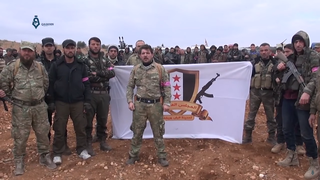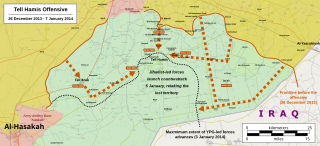
The People's Defense Units (YPG), also called People's Protection Units, is a mainly Kurdish group in Syria and the primary component of the Syrian Democratic Forces (SDF).

Foreign fighters have fought on all four sides of the Syrian Civil War, as well both sides of the War in Iraq. In addition to Sunni foreign fighters, Shia fighters from several countries have joined pro-government militias in Syria, leftist militants have joined Kurdish fighting forces, and other foreign fighters have joined jihadist organizations and private military contractors recruit globally. Estimates of the total number of foreign Sunnis who have fought for the Syrian rebels over the course of the conflict range from 5,000 to over 10,000, while foreign Shia fighters numbered around 10,000 or less in 2013 rising to between 15,000 and 25,000 in 2017.

The Rojava–Islamist conflict, a major theater in the Syrian civil war, started after fighting erupted between the Kurdish People's Protection Units (YPG) and Islamist rebel factions in the city of Ras al-Ayn. Kurdish forces launched a campaign in an attempt to take control of the Islamist-controlled areas in the governorate of al-Hasakah and some parts of Raqqa and Aleppo governorates after al-Qaeda in Syria used those areas to attack the YPG. The Kurdish groups and their allies' goal was also to capture Kurdish areas from the Arab Islamist rebels and strengthen the autonomy of the region of Rojava. The Syrian Democratic Forces would go on to take substantial territory from Islamist groups, in particular the Islamic State of Iraq and the Levant, provoking Turkish involvement in the Syrian Civil War.

In response to rapid territorial gains made by the Islamic State during the first half of 2014, and its universally condemned executions, reported human rights abuses and the fear of further spillovers of the Syrian Civil War, many states began to intervene against it in both the Syrian Civil War and the War in Iraq. Later, there were also minor interventions by some states against IS-affiliated groups in Nigeria and Libya.

The American-led intervention in the Syrian Civil War refers to the American-led support of Syrian rebels and the Syrian Democratic Forces (SDF) during the course of the Syrian civil war, including Operation Inherent Resolve, the active military operation led by the United States, and involving the militaries of the United Kingdom, France, Jordan, Turkey, Canada, Australia, and others against the Islamic State (IS) and al-Nusra Front since 2014. Beginning in 2017–18, the U.S. and its partners have also targeted the Syrian government and its allies via airstrikes and aircraft shoot-downs, mainly in defense of either the SDF or the Revolutionary Commando Army opposition group based in al-Tanf.

The siege of Kobanî was launched by the Islamic State of Iraq and the Levant on 13 September 2014, in order to capture the Kobanî Canton and its main city of Kobanî in northern Syria, in the de facto autonomous region of Rojava.

Turkey's involvement in the Syrian civil war began diplomatically and later escalated militarily. Initially, Turkey condemned the Syrian government at the outbreak of civil unrest in Syria during the spring of 2011; the Turkish government's involvement gradually evolved into military assistance for the Free Syrian Army in July 2011, border clashes in 2012, and direct military interventions in 2016–17, in 2018, in 2019, 2020, and in 2022. The military operations have resulted in the Turkish occupation of northern Syria since August 2016.

The Women's Protection Units or Women's Defense Units is an all-female militia involved in the Syrian civil war. The YPJ is part of the Syrian Democratic Forces, the armed forces of Rojava, and is closely affiliated with the male-led YPG. While the YPJ is mainly made up of Kurds, it also includes women from other ethnic groups in Northern Syria.

The Eastern al-Hasakah offensive was launched in the Al-Hasakah Governorate during the Syrian Civil War, by the Kurdish-majority People's Protection Units, Assyrian Christian militias, and allied Arab forces against the jihadist Islamic State of Iraq and the Levant, with the intent of retaking the areas of the Jazira Canton that had been captured by ISIL. Subsequently, the Syrian Armed Forces also launched an assault against the jihadists, without coordinating with the YPG.

The Battle of Sarrin refers to a military operation during 2015 in the northeastern Aleppo Governorate, during the Syrian Civil War, conducted by Kurdish YPG and allied forces against the Islamic State of Iraq and the Levant in the town of Sarrin, in an effort to capture the town and the surrounding region.

The Western al-Hasakah offensive, dubbed Operation Commander Rûbar Qamishlo by the Kurds, was a military operation during May 2015 in the Al-Hasakah Governorate, during the Syrian Civil War, conducted by Kurdish YPG and allied forces against the Islamic State of Iraq and the Levant. On 31 May 2015, as most of the offensive operations in the western Al-Hasakah Governorate ended, the part of the offensive in the Ras al-Ayn District expanded into the Tell Abyad region, in the northern Raqqa Governorate.

The Tell Abyad offensive or Martyr Rubar Qamışlo operation was a military operation that began in late May 2015 in the northern Raqqa Governorate, during the Syrian Civil War. It was conducted by the Kurdish-majority People's Protection Units (YPG) and the Free Syrian Army (FSA) against the Islamic State of Iraq and the Levant. The offensive took place from the end of May until July 2015. The campaign was the second phase of the Kurdish Operation Commander Rûbar Qamishlo, which began with the Al-Hasakah offensive, and involved the merger of the Kobanî offensive with the former. The focus of the campaign was to capture the key border town of Tell Abyad, and to link the Kobanî and Jazira Cantons in Northern Syria.

The Kobanî massacre was a combination of suicide missions and attacks on Kurdish civilians by the Islamic State of Iraq and the Levant on the Kurdish-majority city of Kobanî, beginning on Thursday, 25 June 2015, and culminating on Friday, 26 June 2015. The attacks continued into 28 June 2015, with the last remaining ISIL militant being killed on the following day. The attacks resulted in 223–233 civilians dead, as well as 35–37 Kurdish militiamen and at least 79 ISIL assailants. It was the second-largest massacre committed by ISIL since it declared a caliphate in June 2014.
The following is a timeline of the Syrian Civil War from January to July 2015. Information about aggregated casualty counts is found at Casualties of the Syrian Civil War.
The following is a timeline of the Syrian Civil War from January to July 2014. Information about aggregated casualty counts is found at Casualties of the Syrian Civil War.
In early 2014, the jihadist group Islamic State of Iraq and the Levant captured extensive territory in Western Iraq in the Anbar campaign, while counter-offensives against it were mounted in Syria. Raqqa in Syria became its headquarters. The Wall Street Journal estimated that eight million people lived under its control in the two countries.
This article contains a timeline of events from January 2015 to December 2015 related to the Islamic State of Iraq and the Levant (ISIL/ISIS). This article contains information about events committed by or on behalf of the Islamic State, as well as events performed by groups who oppose them.
Collaboration with the Islamic State refers to the cooperation and assistance given by governments, non-state actors, and private individuals to the Islamic State (IS) during the Syrian Civil War, Iraqi Civil War, and Libyan Civil War.

The American-led intervention in the Syrian Civil War is the United States-led support of Syrian opposition and the Federation of Northern Syria during the course of the Syrian Civil War and active military involvement led by the United States and its allies — the militaries of the United Kingdom, France, Jordan, Turkey, Canada, Australia and more — against the Islamic State of Iraq and the Levant (ISIL) and al-Nusra Front since 2014. Since early 2017, the U.S. and other Coalition partners have also targeted the Syrian government and its allies via airstrikes and aircraft shoot-downs.

The Battle of Tell Hamis and Tell Brak was fought between the end of December 2013 and the start of January 2014 over control of the town of Tell Hamis and the village of Tell Brak in the al-Hasakah Governorate of northeast Syria during the Syrian Civil War. The armed wings of the Democratic Union Party (PYD), namely the People's and Women's Protection Units, in addition to the Syriac Union Party's Syriac Military Council (MFS), attempted to capture the areas from Salafist jihadists led by the Islamic State of Iraq and the Levant, the al-Nusra Front, and the Islamic Front's Ahrar al-Sham, but were repelled in a counter-offensive by the jihadists.













